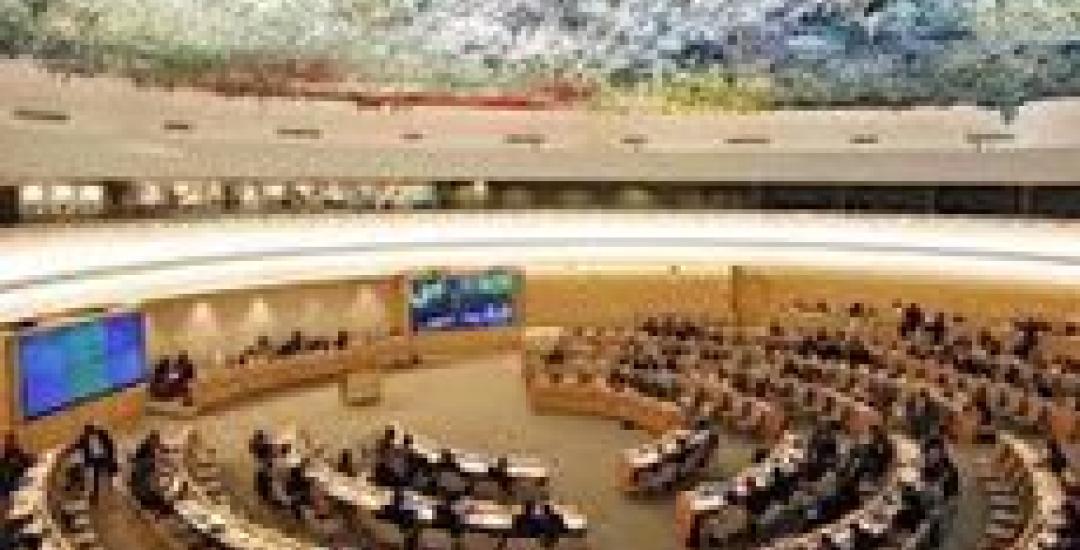
On 29 June 2017, Alkarama submitted its report on the human rights situation in the United Arab Emirates to the Human Rights Council, in view of the UAE’s Universal Periodic Review (UPR) which will be held in January 2018. In its report, Alkarama underscored the most serious human rights violations which continue to persist in the country, such as chain violations committed by the Intelligence forces, including the practice of incommunicado detention and torture, the advanced crackdown on freedom of expression as well as the use and expansion of laws criminalising fundamental freedoms. Alkarama’s report also points out the lack of implementation of the majority of recommendations accepted by the UAE during its second UPR in 2013.
In its report, Alkarama condemns the chain violations perpetrated by the State Security Forces, which are under the direct control of the Ministry of Interior (MoI) and operate without judicial oversight. These forces continue to arrest lawyers, professors, human rights defenders and anyone critical of the government, without a warrant or without informing the individuals of the reason for their arrest. They are then brought to unknown locations and kept for extended periods of time in secret detention, without access to their families or lawyers. During this time, individuals are often subjected to physical and psychological torture in order to obtain a self-incriminating statement that are later used as evidence during proceedings.
Although the UAE ratified the Convention against Torture (UNCAT) in 2013, the practice of torture persists and cases continue to be reported, with the example of numerous consistent allegations emerging in the case of the UAE 94. Despite the UAE’s commitment to investigate all allegations of torture during the last UPR, impunity for the perpetrators of torture prevails as it was also recalled by the former Special Rapporteur on the Independence of Judges and Lawyers (SRIJL), who after her visit in 2014 concluded that more than 200 complaints of torture and ill-treatment had been presented before judges and prosecutors, but were not investigated or accounted for in judicial proceedings.
Furthermore, Alkarama criticises the advanced crackdown on freedom of expression since 2013, as several peaceful activists have been prosecuted for “criticising” the government on social media. Indeed, the UAE continues to use and expand an arsenal of different legislation to fundamentally restrict freedom of expression, such as the Cybercrime Law No. 5 of 2012, which criminalises defamation and provides for punishments of up to life imprisonment for “anyone who publishes information aiming or calling to overthrow or change the ruling system of the State”. In September 2016, Decree Law No. 7/2016 was issued, amending the UAE Penal Code, which now includes provisions severely punishing with 15 to 25 years of prison anyone who “insults the president of the UAE”, and with 10 to 25 years anyone who “harms the reputation of the State”. Moreover, the Anti-terrorism Law No. 7/2014 defines a terrorist act as any act that would “upset the State”, without specifying for example the violent nature of such act, and hence paving the way for the criminalisation of peaceful dissent.
In addition, Alkarama voiced its concern over several other problematic issues, such as discrimination against the stateless population as well as the deprivation of nationality for political dissidents; the lack of cooperation with the UN human rights mechanisms; and the absence of a national human rights institution (NHRI).
The UPR involves a review of the human rights record of all UN Member States by the HRC every four years. The reviews take place through an interactive discussion between the State under review and other UN Member States. NGOs can submit information which can be referred to by any of the States taking part in the interactive discussion. In January 2018, it will be the third time the United Arab Emirates will be reviewed in the framework of the UPR.
For more information or an interview, please contact media@alkarama.org (Dir: +41 22 734 1008).
